Hollow Bar Advantages For Component Manufacturing Industries
Hollow bar and mechanical tubing provide an economic and efficient means of supplying high quality raw material stock for the manufacture of radially machined components; providing a cost effective solution to the use of solid bar.
Hollow bar minimizes material wastage and reduces the total machining time requirements by avoiding the initial drilling operation.
Typical manufacturers that use stainless steel hollow bar to make components that are used in:
- general engineering
- chemical & petrochemical plants
- automotive production
- paper production plants
- textile production plants
- food production equipment
- anti-friction and slide bearing production
Machining Allowances & Production Tolerances
Hollow bar is manufactured in the size ranges most frequently required by mechanical engineering manufacturing companies. However, in the case of hollow bar, the tolerance range for the outside diameter lies in the plus range, and for the inside diameter in the minus range. The wall thickness tolerance is determined by the degree of centre offset; this is due to the effect of the tolerance for the outside and inside diameter, the wall thickness and the centre offset. (See diagram below.)
In the case of mechanical tubing to ASTM A 511, the outside diameter and the wall dimensions generally lie in the centre of the tolerance range. Thus, when ordering product for machining it is important to take into account the differences in the tolerances between the hollow bar and the ASTM A 511 mechanical tubing specifications. In most cases the machining set up is based on centring the outside diameter.
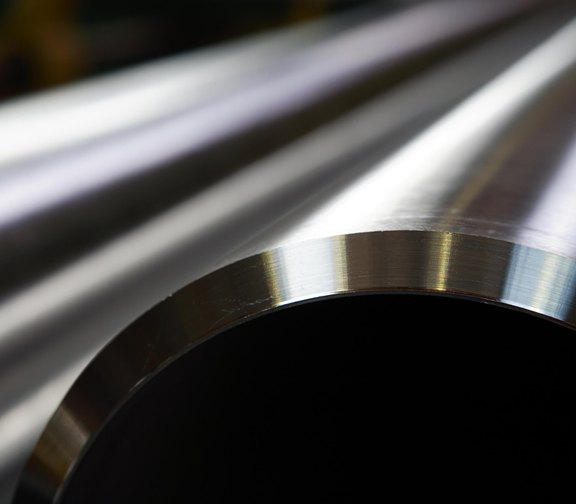
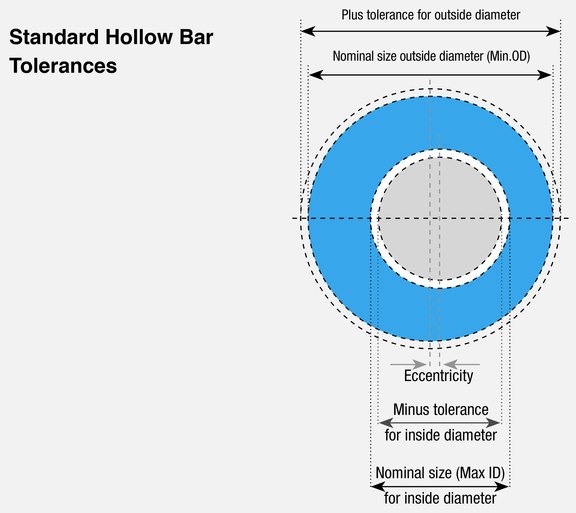
Hollow Bar Dimensional Range and Tolerances
For full details on finish machined dimensions download our datasheet at our Tech Centre.
| Outside diameter range | Dimensional tolerances | |||
|---|---|---|---|---|
| mm | For the outside diameter | D | For the inside diameter | d | For eccentricity (centre offset) | E | For out-of-straightness | h |
| 32 < D < 250 | -0/+2% (min. 1 mm) | +0/-2% (min. 1 mm) | 10% | 1 mm/m |
| Outside diameter range | Machining allowances | |||
| mm | For the outside diameter | For the inside diameter | ||
| 32 < D < 70 | 1.0 mm | 1.0 mm | ||
| 70 < D < 132 | 1.0 mm | 1.0 mm | ||
| 132 < D < 200 | 1.0 mm | 2.0 mm | ||
| 200< D < 250 | 1.0 mm | 2.0 mm | ||
Note: The machining allowances are recommended minimum values and are related to short-length mechanical parts (L<2.5 x D, max. 250 mm). Machining allowances for longer parts or special machining procedures can be customised.
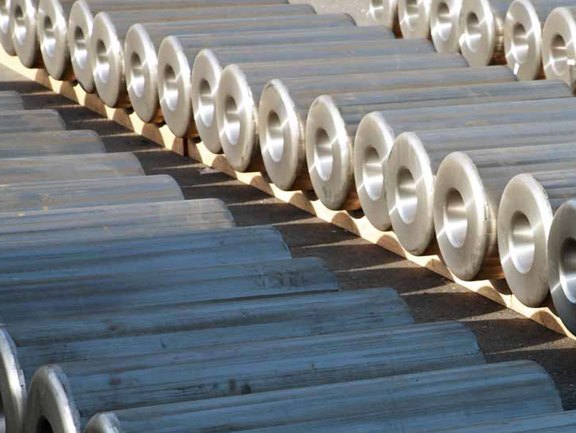
Materials
Standard Grades
Hollow bar and mechanical tubing are supplied in a range of specially selected stainless and acid-resistant standard grades chosen to cover the majority of the corrosion and processing problems that occur in day to day practice.
| MST Designation | USA | Europe EN 10216-5 | Others | ||||
|---|---|---|---|---|---|---|---|
| UNS | Designation (grade) | Standard ASTM | Steel No. | Designation | Standard (SS) | Standard (BS) | |
| DMV 304 | S 30400 | MT 304 (TP 304) | A 511 (A 312) | 1.4301 | X5CrNi18-10 | 2333 | 304 S15 |
| DMV 304L | S 30403 | MT 304L (TP 304L) | A 511 (A 312) | 1.4306 | X2CrNi19-11 | 2352 | 304 S11 |
| DMV 316 | S 31600 | MT 316 (TP 316) | A 511 (A 312) | 1.4401 | X5CrNiMo17-12-2 | 316 S31 | |
| DMV 316L | S 31603 | MT 316L (TP 316L) | A 511 (A 312) | 1.4404 | X2CrNiMo17-12-2 | 316 S11 | |
| DMV 316LMos | 1.4435 | X2CrNiMo18-14-3 | 2353 | 316 S13 | |||
| DMV 321 | S 32100 | MT 321 (TP 321) | A 511 (A 312) | 1.4541 | X6CrNiTi18-10 | 2337 | 321 S31 |
| DMV 316Ti | TP 316 Ti | 1.4571 | X6CrNiMoTi17-12-2 | 2350 | |||
| DMV 22.5 | S 31803 | 1.4462 | X2CrNiMoN22-5-3 | ||||
(…) Grade designation and/or standard not specific for Hollow Bars.
VALIMA GRADES
VALIMA TECHNOLOGY for that extra machining advantage.
Refining both the melting method and the extrusion process produces machining speeds up to 50% higher than standard materials - without compromising performance or compliance to standards.
The VALIMA process modifies the inclusion structure, utilising the benefit of:
- Optimising the sulphur content.
- Modifying the inclusion structure to create globular, malleable, low melting point oxide type inclusions which play a significant role of self lubricating the metal-tool interface.
- Eliminating the presence of hard and abrasive inclusions which impact tool life and performance.
- Improved chip breaking with a consequent reduction of cutting edge too-tip wear.
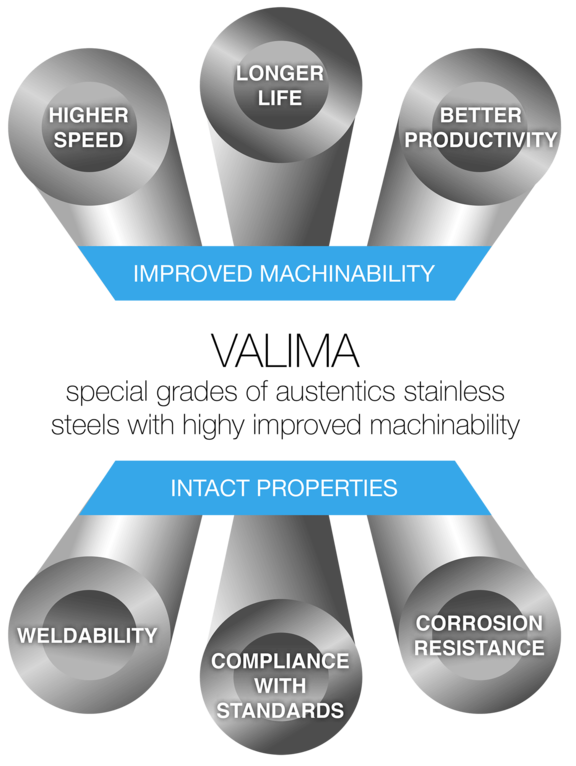
| VALIMA Designation | MST Designation | USA | Europe EN 10216-5 | Others | ||||
|---|---|---|---|---|---|---|---|---|
| UNS | Designation (grade) | Standard ASTM | Steel No. | Designation | Standard (SS) | Standard (BS) | ||
| VALIMA 304 | DMV 304 MC | S 30400 | MT 304 (TP 304) | A 511 (A 312) | 1.4301 | X5CrNi18-10 | 2333 | 304 S15 |
| VALIMA 304L | DMV 304 LMC | S 30403 | MT 304L (TP 304L) | A 511 (A 312) | 1.4306 | X2CrNi19-11 | 2352 | 304 S11 |
| VALIMA 316 | DMV 316 MC | S 31600 | MT 316 (TP 316) | A 511 (A 312) | 1.4401 | X5CrNiMo17-12-2 | 316 S31 | |
| VALIMA 316L | DMV 316 LMC | S 31603 | MT 316L (TP 316L) | A 511 (A 312) | 1.4404 | X2CrNiMo17-12-2 | 316 S11 | |
| VALIMA 4435 | DMV 316 L Mos*MC | 1.4435 | X2CrNiMo18-14-3 | 2353 | 316 S13 | |||
(…) Grade designation and / or standard not specific for Hollow Bars.
* DMV 316L with 2.5 - 3% Mo.
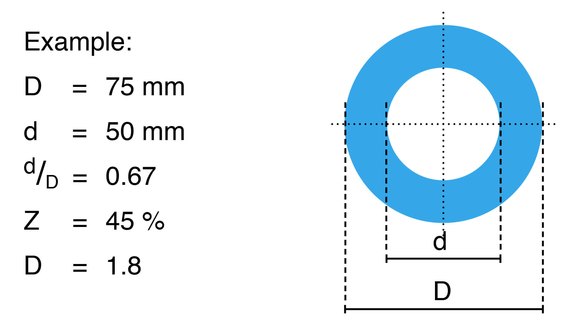
Typical Material Savings
‘Z’ represents the loss of material involved when turning a solid round into a mechanical tube. Here 45 % of the solid round must be removed for this purpose.
The dotted line illustrates the tube length factor ‘D’, which indicates the extra length available for the mechanical parts production as opposed to solid rounds of the same weight.
The example shows a 1.8-fold tube length increase, which means that almost twice as many parts can be made from the tubular weight of material.
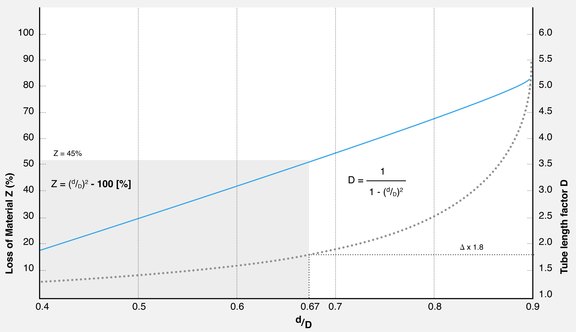
Standards & Norms
Hollow bar is typically manufactured acc to mechanical tube standard ASTM A511.
| Wall thickness tolerance % | |||||||
|---|---|---|---|---|---|---|---|
| Outside diameter inches | Ratio of wall thickness to outside diameter | Outside diameter tolerance inches | 0.109” and under | 0.109” to 0.172” incl. | Over 0.172” to 0.203” incl. | Over 0.203” | Cut length in. * |
| Under 3 | All wall thicknesses | +/- 0.023 | +/- 16.5 % | +/- 15 % | +/- 14 % | +/- 12.5 % | 3/ 16 |
| 3 to 5 1/ 2 excl. | All wall thicknesses | +/- 0.031 | +/- 16.5 % | +/- 15 % | +/- 14 % | +/- 12.5 % | 3/ 16 |
| 5 1/ 2 to 8 excl. | All wall thicknesses | +/- 0.047 | +/- 12.5 % | 3/ 16 | |||
| 8 to 9 3/ 4 incl. | 5 % and over | +/- 0.047 ** | +/- 12.5 % | 3/ 16 | |||
(…) Grade designation and / or standard not specific for Hollow Bars.
* DMV 316L with 2.5 - 3% Mo.